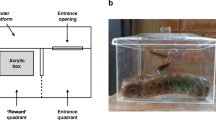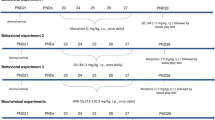Abstract
Social short-term memory in rodents is based on the recognition of a juvenile by an adult conspecific when the juvenile is presented on two successive occasions. Cannabimimetics are claimed to induce memory deficits in both humans and animals. In the brain, they mainly bind to CB1 receptors for which anandamide is a purported endogenous ligand. SR 141716, a specific antagonist of CB1 receptors, dose-dependently reverses biochemical and pharmacological effects of cannabimimetics. More particularly, it antagonizes the inhibition of hippocampal long-term potentiation induced by WIN 55,212-2 and anandamide, and it increases arousal when given alone. The present experiments study the ability of SR 141716 (from 0.03 to 3 mg/kg SC) to facilitate short-term olfactory memory in the social recognition test in rodents. SR 141716 improved social recognition in a long intertrial paradigm with a threshold dose of 0.1 mg/kg SC. At 1 mg/kg, it antagonized the memory disturbance elicited by retroactive inhibition. Scopolamine (0.06 mg/kg IP) partially reversed its memory-enhancing effect. Moreover, SR 141716 reduced memory deficit in aged rats (0.03–0.1 mg/kg) and mice (0.3–1 mg/kg). As SR 141716 is not known to exhibit any pharmacological activity which is not mediated by CB1 receptors, the results strongly support the concept that blockade of CB1 receptors plays an important role in consolidation of short-term memory in rodents and suggest there may be a role for an endogenous cannabinoid agonist tone (anandaminergic) in forgetting.
Similar content being viewed by others

References
Bartus RT, Dean RL, Beer B, Lippa AS (1982) The cholinergic hypothesis of geriatric memory dysfunction. Science 217:408–417
Childers SR, Roy MB, Stark S (1993) G-protein-mediated activities of cannabinoid receptors in cerebellar granule cells. Soc Neurosci Abstr 19:1388
Collins DR, Pertwee RG, Davies SN (1995) Prevention by the cannabinoid antagonist, SR 141716A, of cannabinoid-mediated blockade of long-term potentiation in the rat hippocampal slice. Br J Pharmacol 115:869–870
Costa T, Ogino Y, Munson PJ, Onaran HO, Rodbard D (1992) Drug efficacy at guanine nucleotide-binding regulatory protein-linked receptors: thermodynamic interpretation of negative antagonism and of receptor activity in the absence of ligand. Mol Pharmacol 41:549–560
Crawley JN, Corwin RL, Robinson JK, Felder CC, Devane WA, Axelrod J (1993) Anandamide, an endogenous ligand of the cannabinoid receptor, induces hypomotility and hypothermia in vivo in rodents. Pharmacol Biochem Behav 46:967–972
Dantzer R, Bluthé RM, Koob GF, Le Moal M (1987) Modulation of social memory in male rats by neurohypophyseal peptides. Psychopharmacology 91:363–368
Darley CF, Tinklenberg JR, Roth WT, Hollister LE, Atkinson RC (1973) Influence of marihuana on storage and retrieval processes in memory. Mem Cognit 1:196–200
Deutsch DG, Chin SA (1993) Enzymatic synthesis and degradation of anandamide, a cannabinoid receptor agonist. Biochem Pharmacol 46:791–796
Devane WA, Hanus L, Breuer A, Pertwee RG, Stevenson LA, Griffin MG, Gibson D, Mandelbaum A, Etinger A, Mechoulam R (1992) Isolation and structure of a brain constituent that binds to the cannabinoid receptor. Science 258:1946–1949
Dittrich A, Bättig K, Zeppelin IV (1973) Effects of (−)-delta-9-tetrahydrocannabinol (delta-9-THC) on memory, attention and subjective state. Psychopharmacologia 33:369–376
Fride E, Mechoulam R (1993) Pharmacological activity of the cannabinoid receptor agonist, anandamide, a brain constituent. Eur J Pharmacol 231:313–314
Gold PE, Van Buskirk R, Haycock JW (1977) Effects of postraining epinephrine injections on retention of avoidance training in mice. Behav Biol 20:197–204
Griffin MG, Taylor GT (1995) Norepinephrine modulation of social memory: evidence for a time-dependent functional recovery of behavior. Behav Neurosci 109:466–473
Herkenham M, Lynn AB, Johnson MR, Melvin LS, de Costa BR, Rice KC (1991) Characterization and localization of cannabinoid receptors in rat brain: a quantitative in vitro autoradiographic study. J Neurosci 11:563–583
Heyser CJ, Hampson RE, Deadwyler SA (1993) Effects of delta-9-tetrahydrocannabinol on delayed match to sample performance in rats: alterations in short-term memory associated with changes in task specific firing of hippocampal cells. J Pharmacol Exp Ther 264:294–307
Hlinák Z, Krejcí I (1994) Effects of excitatory amino acid antagonists on social recognition of male rats. Behav Pharmacol 5:239–244
Hovland CI (1951) Human learning and retention. In: Stevens SS (ed) Handbook of experimental psychology, 2nd edn. John Wiley, New York, pp 613–689
Lemaire M, Böhme GA, Piot O, Roques BP, Blanchard JC (1994) CCK-A and CCK-B selective receptor agonists and antagonists modulate olfactory recognition in male rats. Psychopharmacology 115:435–440
Lichtman AH, Martin BR (1995) The novel cannabinoid antagonist SR 141716 A blocks Δ9-THC impairment of working memory in rats. Soc Neurosci Abstr 21:167
Mailleux P, Vanderhaeghen JJ (1992) Age-related loss of cannabinoid receptor binding sites and mRNA in the rat striatum. Neurosci Lett 147:179–181
Mallet PE, Beninger RJ (1995) The endogenous cannabinoid receptor agonist anandamide impairs working memory but not reference memory in rats. Soc Neurosci Abstr 21:167
Matsuda LA, Lolait SJ, Brownstein MJ, Young AC, Bonner TI (1990) Structure of a cannabinoid receptor and functional expression of the cloned cDNA. Nature 346:561–564
Miller LL, Branconnier RJ (1983) Cannabis: effects on memory and the cholinergic limbic system. Psychol Bull 93:441–456
Munro S, Thomas KL, Abu-Shaar M (1993) Molecular characterization of a peripheral receptor for cannabinoids. Nature 365:61–65
Nakamura EM, Da Silva EA, Concilio GV, Wilkinson DA, Masur J (1991) Reversible effects of acute and long-term administration of Δ9-tetrahydrocannabinol (THC) on memory in the rat. Drug Alcohol Depend 28:167–175
Nowicky AV, Teyler TJ (1987) The modulation of long-term potentiation by delta-9-tetrahydrocannabinol in the rat hippocampus, in vitro. Brain Res Bull 19:663–672
Pério A, Terranova JP, Worms P, Bluthé RM, Dantzer R, Bizière K (1989) Specific modulation of social memory in rats by cholinomimetic and nootropic drugs, by benzodiazepine inverse agonists, but not by psychostimulants. Psychopharmacology 97:262–268
Pério A, Rinaldi-Carmona M, Maruani J, Barth F, Le Fur G, Soubrie P (1996) Central mediation of the cannabinoid cue: activity of a selective CB1 antagonist, SR 141716A. Behav Pharmacol 7:65–71
Popik P, Vos PE, Van Ree JM (1992) Neurohypophyseal hormone receptors in the septum are implicated in social recognition in the rat. Behav Pharmacol 3:351–358
Rinaldi-Carmona M, Barth F, Héaulme M, Shire D, Calandra B, Congy C, Martinez S, Maruani J, Néliat G, Caput D, Ferrara P, Soubrié P, Brelière JC, Le Fur G (1994) SR 141716A, a potent and selective antagonist of the brain cannabinoid receptor. FEBS Lett 350:240–244
Santucci V, Storme JJ, Soubrié P, Le Fur G (1996) Arousal-enhancing properties of the CB1 cannabinoid receptor antagonist SR 141716A in rats as assessed by electroencephalographic spectral and sleep-waking cycle analysis. Life Sci 58:103–110
Sawyer TF, Hengehold AK, Perez WA (1984) Chemosensory and hormonal mediation of social memory in male rats. Behav Neurosci 98:908–913
Schwartz RH, Gruenewald PJ, Klitzner M, Fedio P (1989) Short-term memory impairment in cannabis-dependent adolescents. Am J Dis Child 143:1214–1219
Terranova JP, Pério A, Worms P, Le Fur G, Soubrié P (1994) Social olfactory recognition in rodents: deterioration with age, cerebral ischaemia and septal lesion. Behav Pharmacol 5:90–98
Terranova JP, Michaud JC, Le Fur G, Soubrié P (1995) Inhibition of long-term potentiation in rat hippocampal slices by anandamide and WIN 55212-2; reversal by SR 141716A, a selective antagonist of CB1 cannabinoid receptors. Naunyn-Schmiedeberg's Arch Pharmacol 352:576–579
Westlake TM, Howlett AC, Bonner TI, Matsuda LA, Herkenham M (1994) Cannabinoid receptor binding and messenger RNA expression in human brain: an in vitro receptor autoradiography and in situ hybridization histochemistry study of normal aged and Alzheimer's brains. Neuroscience 63:637–652
Author information
Authors and Affiliations
Rights and permissions
About this article
Cite this article
Terranova, J.P., Storme, J.J., Lafon, N. et al. Improvement of memory in rodents by the selective CB1 cannabinoid receptor antagonist, SR 141716. Psychopharmacology 126, 165–172 (1996). https://doi.org/10.1007/BF02246352
Received:
Revised:
Issue Date:
DOI: https://doi.org/10.1007/BF02246352



